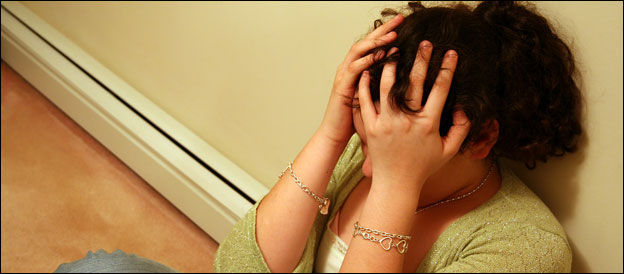Home > Anxiety
What happens to your body when you’re in panic mode

It takes only a few seconds to spur a phobic meltdown. Here is a play-by-play of a panicked response.
0 to 1 second:
Your eyes or ears identify your phobic trigger (a needle, a snake, the dentist's drill) and instantly send a "threat!" message to your amygdala, the brain's fear center.
MORE: 3 Methods That Help You Face Your Fears and Overcome Anxiety
1 to 3 seconds:
The amygdala, in turn, overrides the prefrontal cortex--a.k.a. your brain's logic center--and tells your adrenal glands to shoot out the stress hormones adrenaline and cortisol. Those prompt sweating (to help you stay cool), rapid breathing and heartbeat (to help pump oxygen to your muscles), and dilation of the pupils (to help you better keep an eye on that threat).
MORE: 6 Ways to Calm Yourself Down When You Start to Panic
Within 5 seconds:
Your brain begins releasing endorphins, natural painkillers that could protect you during a physical attack. It also secretes a small amount of the feel-good hormone dopamine (hence the "rush" some people get in scary situations)--but not enough to temper your hormone-fueled panic. Some phobics experience sharp rises and drops in blood pressure, causing them to pass out. Many experts believe this stems from an evolutionary "freeze" or "play dead" response.
MORE: Inside the Mind of a _____ Phobe
During and after the next few minutes:
If you can't calm yourself down, you'll need to flee the scene to get your prefrontal cortex back online. Once the audible or visual threat is gone, it directs the amygdala to put a stop order on those stress hormones. You might still be jumpy for a day or two (every stick could be a snake). If yours is a true phobia, your amygdala will spur this same outsize response every time--until you can retrain your brain to respond to your phobic trigger in a more logical way.
MORE: Everything You Ever Wanted to Know About Anxiety--and How to Conquer It
Recommend Article
 High blood pressure: How low should you go?
High blood pressure: How low should you go?
 Jobs with highest and lowest heart disease risk revealed
Jobs with highest and lowest heart disease risk revealed
 High cholesterol levels may make it harder to get pregnant
High cholesterol levels may make it harder to get pregnant
Newsletter signup
Get the updates!
Get regular updates on articles, health and fitness tips and strategies, exclusive deals and giveaways, and more!
Trending Articles
© Blood Pressure Cure.
Terms & Conditions | Privacy Policy | Contact Us | Subscribe